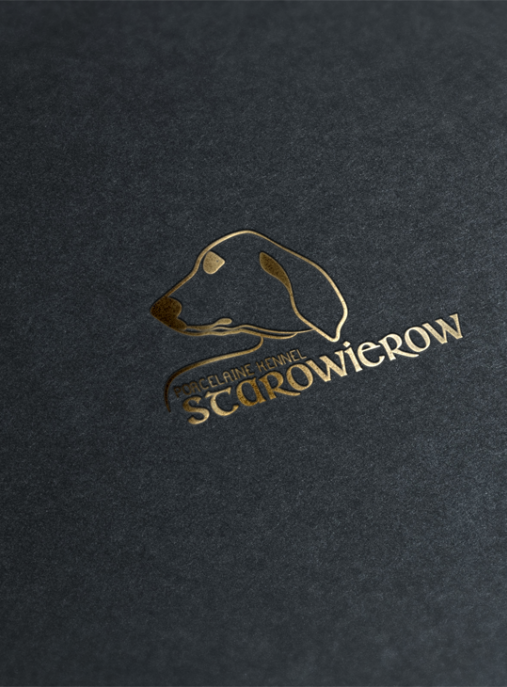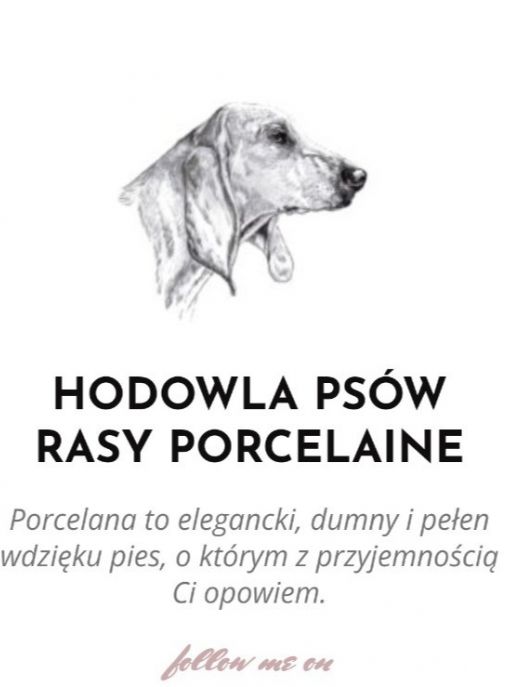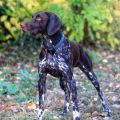The Porcelaine dog breed is a magnificent and elegant breed that is known for its striking appearance and exceptional hunting abilities. With its regal and noble demeanor, the Porcelaine is a breed that has captivated dog enthusiasts for centuries. This breed is characterized by its sleek and muscular build, with a short and dense coat that is predominantly white in color, adorned with beautiful reddish-brown markings. The Porcelaine's expressive eyes, long and droopy ears, and well-proportioned body make it a truly remarkable sight to behold.
The history of the Porcelaine breed can be traced back to France, where it was developed in the 19th century. It is believed that the breed was created by crossing various scent hounds, including the Montaimboeuf, the English Foxhound, and the now-extinct Talbot Hound. The goal was to create a dog with exceptional scenting abilities, stamina, and a keen sense of smell, which would make it an ideal hunting companion.
According to the FCI (Fédération Cynologique Internationale) typology, the Porcelaine belongs to Group 6: Scenthounds and Related Breeds. This group includes various breeds that excel in tracking and trailing scents, such as the Basset Hound, Beagle, and Bloodhound. The Porcelaine's classification within this group highlights its exceptional olfactory capabilities and its purpose as a hunting dog.
The Porcelaine is primarily a hunting breed, specifically bred for tracking and trailing game. Its keen sense of smell, combined with its remarkable endurance and agility, allows it to excel in various hunting activities, including hare and boar hunting. However, despite its hunting prowess, the Porcelaine also makes an excellent companion and family pet. Its gentle and affectionate nature, coupled with its intelligence and loyalty, make it a wonderful addition to any household.
In terms of size, the Porcelaine is considered a medium-sized breed. Males typically stand between 22 to 24 inches (56 to 61 cm) at the shoulder, while females are slightly smaller, ranging from 21 to 23 inches (53 to 58 cm). The weight of a Porcelaine dog usually falls between 55 to 62 pounds (25 to 28 kg). These dimensions, combined with its well-muscled physique, give the Porcelaine a balanced and athletic appearance.
The life expectancy of a Porcelaine dog is generally around 12 to 14 years, although with proper care and a healthy lifestyle, some individuals have been known to live even longer. Regular exercise is essential for this breed to maintain its physical and mental well-being. Daily walks, jogging, or engaging in various canine sports and activities will help keep the Porcelaine happy and content.
One interesting fact about the Porcelaine breed is its unique coat coloration. The breed's name, "Porcelaine," is derived from the French word for porcelain, which perfectly describes the dog's pristine white coat. The reddish-brown markings, often referred to as "orange patches," are strategically placed on the head, ears, and body, adding a touch of elegance and character to the breed's appearance.
Another notable characteristic of the Porcelaine is its exceptional sense of smell. This breed possesses one of the most acute noses among all dog breeds, allowing it to track scents over long distances with remarkable precision. The Porcelaine's scenting abilities, combined with its endurance and agility, make it a highly sought-after breed for hunting enthusiasts.
In conclusion, the Porcelaine dog breed is a remarkable and versatile breed that excels in both hunting and companionship. With its striking appearance, exceptional scenting abilities, and gentle nature, the Porcelaine has rightfully earned its place among the most esteemed breeds. Whether as a hunting partner or a beloved family pet, the Porcelaine is sure to bring joy, loyalty, and endless adventures to its fortunate owners.

Porcelaine dogs, also known as Chien de Franche-Comté, are a breed known for their elegant appearance and gentle nature. With their striking white coat and soulful eyes, they exude an air of grace and charm. But what truly sets them apart is their exceptional character, making them a beloved choice for dog enthusiasts worldwide.
The character of Porcelaine dogs can be described as friendly, affectionate, and intelligent. They are known for their gentle and patient nature, making them excellent companions for families, children, and even other pets. Porcelaines thrive on human interaction and are known to form strong bonds with their owners, often displaying unwavering loyalty and devotion.
One of the most endearing qualities of Porcelaines is their calm and composed demeanor. They are not prone to excessive barking or aggression, making them well-suited for apartment living or households with close neighbors. However, they do possess a keen sense of alertness, making them excellent watchdogs who will bark to alert their owners of any potential danger.
When it comes to training, Porcelaines are intelligent and eager to please, making them relatively easy to train. They respond well to positive reinforcement techniques, such as treats, praise, and playtime. Early socialization is crucial for Porcelaines to ensure they grow up to be well-rounded and confident dogs. Exposing them to various environments, people, and other animals from a young age will help prevent any potential shyness or fearfulness.
Porcelaines have a moderate energy level and require regular exercise to keep them happy and healthy. Daily walks, play sessions, and mental stimulation through puzzle toys or obedience training are essential to prevent boredom and destructive behaviors. They also enjoy participating in activities such as tracking, scent work, and agility, as they possess a natural instinct for hunting and tracking scents.
When it comes to grooming, Porcelaines have a short, dense coat that requires minimal maintenance. Regular brushing to remove loose hair and occasional baths are usually sufficient to keep their coat clean and healthy. Their droopy ears should be checked regularly for any signs of infection, and their nails should be trimmed regularly to prevent overgrowth.
In conclusion, Porcelaine dogs are a breed with a remarkable character. Their friendly and affectionate nature, combined with their intelligence and trainability, make them an excellent choice for families and individuals alike. With proper socialization, training, and exercise, Porcelaines can thrive in various living environments and bring joy and companionship to their owners for many years to come.
The Porcelaine dog breed is a beautiful and elegant breed known for its striking white coat and gentle temperament. Caring for a Porcelaine requires a combination of attention, love, and specific care guidelines to ensure their well-being. In this text, we will provide you with an extensive description of the recommended care for Porcelaine dogs, including tips on what to do and what not to do.
First and foremost, Porcelaines are active dogs that require regular exercise to maintain their physical and mental health. Daily walks, playtime, and opportunities to run in a secure area are essential for this breed. However, it's important to avoid excessive exercise, especially in hot weather, as Porcelaines can be prone to overheating due to their dense coat.
Grooming is another crucial aspect of Porcelaine care. Their short, dense coat is relatively low-maintenance, but regular brushing is necessary to remove loose hair and keep their coat clean and healthy. Porcelaines are known to be clean dogs, so bathing should only be done when necessary to avoid drying out their skin. Additionally, regular dental care, such as brushing their teeth and providing dental chews, is essential to maintain their oral health.
Porcelaines are social dogs that thrive on human companionship. They are not suited for a life of solitude or being left alone for extended periods. They require regular interaction, mental stimulation, and socialization with both humans and other animals. Providing them with toys, puzzle games, and training sessions will help keep their minds engaged and prevent boredom.
When it comes to feeding, Porcelaines have specific dietary needs. A high-quality dog food that is appropriate for their age, size, and activity level is recommended. It's important to measure their food portions to prevent overfeeding, as Porcelaines can be prone to weight gain. Regular visits to the veterinarian will help monitor their weight and overall health.
Porcelaines are generally healthy dogs, but like any breed, they can be prone to certain health issues. Regular veterinary check-ups, vaccinations, and preventive treatments for parasites are essential to keep them in optimal health. It's also important to be aware of any breed-specific health concerns, such as hip dysplasia or ear infections, and take appropriate measures to prevent or manage them.
In terms of what not to do, it's crucial to avoid harsh training methods or punishment-based techniques with Porcelaines. They respond best to positive reinforcement training, which involves rewarding good behavior rather than punishing bad behavior. Harsh treatment can lead to fear or aggression in this sensitive breed.
Furthermore, it's important not to neglect their mental and emotional needs. Porcelaines thrive on human interaction and can become anxious or develop behavioral issues if left alone for long periods. Avoid leaving them alone for extended periods and provide them with plenty of mental stimulation and socialization opportunities.
Lastly, it's important to remember that Porcelaines are scent hounds with a strong prey drive. They should always be kept on a leash or in a securely fenced area when outside, as they may be inclined to chase after scents or small animals. This will help prevent accidents or the loss of your beloved pet.
In conclusion, caring for a Porcelaine dog requires attention, love, and adherence to specific care guidelines. Regular exercise, grooming, socialization, and a balanced diet are essential for their well-being. Positive reinforcement training, regular veterinary care, and providing mental stimulation are also crucial. By following these tips and avoiding harsh treatment or neglect, you can ensure that your Porcelaine dog lives a happy, healthy, and fulfilling life.
The Porcelaine dog breed is renowned for its striking and distinctive coat color, which is commonly referred to as "porcelain." This unique coloration sets them apart from other breeds and adds to their overall charm and elegance. The Porcelaine's coat is predominantly white, with well-defined patches of rich, glossy black or orange-brown markings.
The base color of the Porcelaine's coat is a pure, pristine white, reminiscent of fine porcelain china. This white hue is often described as being luminous and radiant, giving the dog an ethereal and almost angelic appearance. The white coat serves as a canvas for the contrasting black or orange-brown markings, creating a visually stunning and harmonious color combination.
The black markings on a Porcelaine are deep and intense, providing a stark contrast against the white background. These markings are typically found on the head, ears, and along the back, forming a distinct saddle-like pattern. The black coloration may also extend to the tail, creating a beautiful and eye-catching plume. The black patches are well-defined and sharply delineated, adding to the breed's overall elegance and refinement.
In some Porcelaine dogs, the black markings may be replaced by rich, warm orange-brown patches. This color variation is equally captivating and adds a touch of warmth and vibrancy to the breed's appearance. The orange-brown markings are often found on the head, ears, and body, mirroring the distribution of the black patches. The intensity of the orange-brown color can vary, ranging from a deep, reddish-brown to a lighter, golden hue.
The Porcelaine's coat is short, dense, and glossy, enhancing the beauty of its coloration. The smooth texture of the fur allows the colors to shine and reflect light, giving the dog an exquisite and polished look. The coat is also weather-resistant, providing protection against the elements and allowing the Porcelaine to excel in various outdoor activities.
The color of the Porcelaine's coat not only adds to its aesthetic appeal but also serves a practical purpose. The contrasting black or orange-brown markings make the dog highly visible in the field, aiding hunters in tracking and locating them amidst dense vegetation. This coloration is not only visually pleasing but also functional, allowing the Porcelaine to fulfill its role as a skilled and efficient hunting companion.
In conclusion, the common color of Porcelaine dogs is a stunning combination of pure white with well-defined patches of glossy black or orange-brown. This unique coloration, reminiscent of fine porcelain, adds to the breed's elegance and charm. Whether adorned with black or orange-brown markings, the Porcelaine's coat is a testament to its beauty, functionality, and overall appeal.
The Porcelaine dog breed is known for its elegant appearance, gentle nature, and exceptional hunting skills. When it comes to their health, Porcelaines are generally considered to be a robust and healthy breed. However, like any other dog breed, they are prone to certain health issues that owners should be aware of. In this text, we will explore the most common diseases found in Porcelaine dogs and provide tips on how to care for their overall health.
One of the most prevalent health concerns in Porcelaine dogs is hip dysplasia. This condition occurs when the hip joint doesn't develop properly, leading to discomfort, pain, and eventually arthritis. To minimize the risk of hip dysplasia, it is crucial to ensure that the parents of a Porcelaine puppy have been screened for this condition. Regular exercise, a balanced diet, and maintaining a healthy weight can also help reduce the likelihood of hip dysplasia.
Another common health issue in Porcelaines is ear infections. Due to their long, droopy ears, Porcelaines are more prone to developing infections caused by trapped moisture, dirt, or wax. Regularly inspecting and cleaning their ears can help prevent infections. It is important to use a veterinarian-approved ear cleaning solution and avoid inserting anything deep into the ear canal to prevent injury.
Porcelaine dogs are also susceptible to certain eye problems, including cataracts and progressive retinal atrophy (PRA). Cataracts can cause cloudiness or opacity in the lens of the eye, leading to vision impairment or blindness. PRA, on the other hand, is a degenerative disease that gradually leads to the loss of vision. Regular eye examinations by a veterinarian can help detect these conditions early on, allowing for appropriate treatment or management.
Maintaining good dental hygiene is crucial for Porcelaine dogs, as they are prone to dental issues like periodontal disease and tooth decay. Regular brushing of their teeth, feeding them dental-friendly treats, and providing them with appropriate chew toys can help keep their teeth clean and healthy. Additionally, scheduling regular dental check-ups with a veterinarian is essential to identify and address any dental problems promptly.
To ensure the overall health and well-being of Porcelaine dogs, a balanced diet is essential. Feeding them high-quality dog food that meets their nutritional needs is crucial. Avoiding overfeeding and monitoring their weight is important to prevent obesity, which can lead to various health problems. Regular exercise is also vital for Porcelaines to maintain a healthy weight, stimulate their minds, and prevent behavioral issues.
Regular veterinary check-ups are essential for Porcelaine dogs to monitor their overall health and detect any potential health issues early on. Vaccinations, parasite prevention, and routine blood tests are part of a comprehensive healthcare plan for these dogs. Additionally, providing a safe and comfortable environment, socializing them from a young age, and offering mental stimulation through training and interactive toys are all important aspects of caring for their health and well-being.
In conclusion, while Porcelaine dogs are generally healthy, they are prone to certain health issues such as hip dysplasia, ear infections, eye problems, and dental diseases. By being proactive in their care, including regular veterinary check-ups, proper nutrition, exercise, and maintaining good hygiene practices, owners can help ensure that their Porcelaine dogs lead long, happy, and healthy lives.
The Porcelaine dog breed is known for its elegance, grace, and hunting abilities. To ensure the health and well-being of these beautiful dogs, it is crucial to provide them with a balanced and nutritious diet. Proper nutrition plays a vital role in their growth, development, and overall longevity. In this text, we will delve into the nutritional needs of Porcelaine dogs, offering advice on what and how to feed them, as well as highlighting certain foods to avoid.
Porcelaine dogs are medium-sized, muscular dogs with a lean body structure. They have high energy levels and require a diet that supports their active lifestyle. A well-balanced diet for Porcelaine dogs should consist of high-quality proteins, healthy fats, complex carbohydrates, vitamins, and minerals.
Protein is an essential component of a Porcelaine dog's diet as it aids in muscle development and repair. High-quality protein sources such as lean meats (chicken, turkey, beef), fish, and eggs should be included in their meals. It is important to ensure that the protein sources are cooked thoroughly to eliminate any potential bacteria or parasites.
Healthy fats are another crucial element in a Porcelaine dog's diet. Fats provide energy, support brain function, and help maintain healthy skin and coat. Incorporating omega-3 fatty acids, found in fish oil or flaxseed oil, can promote a shiny coat and reduce inflammation.
Complex carbohydrates are a valuable source of energy for Porcelaine dogs. Whole grains like brown rice, quinoa, and oats are excellent choices. These carbohydrates provide fiber, which aids in digestion and helps prevent constipation.
Vitamins and minerals are essential for a Porcelaine dog's overall health. Fresh fruits and vegetables, such as carrots, spinach, blueberries, and sweet potatoes, are excellent sources of vitamins and minerals. These can be added to their meals or given as healthy treats.
While it is important to focus on what to include in a Porcelaine dog's diet, it is equally crucial to be aware of certain foods that should be avoided. Some human foods can be toxic to dogs and should never be given to them. These include chocolate, grapes, raisins, onions, garlic, caffeine, alcohol, and artificial sweeteners (such as xylitol). These foods can cause severe health issues, including kidney damage, liver failure, and even death.
Additionally, it is important to avoid feeding Porcelaine dogs with excessive amounts of salt, sugar, and processed foods. These can lead to obesity, dental problems, and other health complications.
Feeding schedules should be established and adhered to for Porcelaine dogs. Puppies require more frequent meals, typically three to four times a day, while adult dogs can be fed twice a day. It is important to monitor their weight and adjust portion sizes accordingly to prevent overfeeding or underfeeding.
Always provide fresh, clean water for your Porcelaine dog to ensure proper hydration. Water should be readily available throughout the day, especially during and after exercise.
In conclusion, a well-balanced and nutritious diet is essential for the health and well-being of Porcelaine dogs. Providing them with high-quality proteins, healthy fats, complex carbohydrates, vitamins, and minerals will support their active lifestyle and promote longevity. Avoiding toxic foods and maintaining a consistent feeding schedule will help ensure their optimal health. Remember, consulting with a veterinarian is always recommended to tailor the diet to your Porcelaine dog's specific needs.














